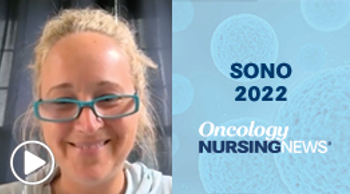
An expert explained the role oncology nurses and advanced practice providers play in caring for patients with sarcoma during treatment.

An expert explained the role oncology nurses and advanced practice providers play in caring for patients with sarcoma during treatment.

New targeted therapies offer certain patients with non–small cell lung cancer more second-line treatment options.

Beth Sandy, MSN, CRNP, and Tajuana Bradley, MSN, APRN-BC, discuss the importance of molecular testing in non–small cell lung cancer.

Lindsey Zinck, PhD, RN, OCN, NEA-BC, and Melania Zisa, RN, BSN, OCN, discuss why it may be time to make the bell ringing ceremony a more inclusive celebration in cancer care.

Quizartinib plus standard intensive induction and consolidation therapy was associated with longer survival rates in patients with FLT3-ITD–positive acute myeloid leukemia.

Tetyana Furmanets, CRNP, MSN, discusses the tools she uses to help patients navigate myeloproliferative neoplasm symptom management.

Patients about to undergo Mohs microscopic surgery reported that they were more likely to request over-the-counter medications if they perceived their risk of opioid addiction to be high.

Patients with unresectable pancreatic cancers and cholangiocarcinoma face poor prognoses, but systemic treatment continues to evolve.

A key component of health equity includes ensuring that clinical trials reflect subgroups of patients who are more reflective of real-world populations.

HER2-directed antibody-drug conjugates (ADCs) play an important role in the treatment of breast and gastric cancer.

In this episode of "The Vitals," Sarah Donahue, MPH, NP, AOCNP; Jamie Carroll, APRN, CNP, MSN; Theresa Wicklin Gillespie, PhD, MA, RN, FAAN; and Elizabeth Prechtel-Dunphy, DNP, RN, ANP-BC, AOCN, exchange clinical pearls for treating patients receiving antibody-drug conjugates.

Beth Sandy, MSN, CRNP, discusses the application of 2 FDA approved drugs for patients with non–small cell lung cancer and an exon 20 insertion mutation.

At the 6th Annual SONO meeting, Beth Sandy, MSN, CRNP, reviewed available treatment options for patients with identified driver mutations in non–small cell lung cancer.

Faith Mutale, CRNP, discusses the paradigm shift needed in oncology to address clinical trial enrollment hesitancy among African American patients with lung cancer.

Beth Sandy, MSN, CRNP, discusses some of the challenges that may be associated with molecular testing, and how oncology nurses can help play a role in ensuring that the reports are received.

A new method of developing CAR T-cell products produced infusion-ready cells in under 24 hours.

A recent study demonstrated that patients with prostate cancer on active surveillance reported reduced PSA levels after a 12-week HIIT regime.

Patients with progressed multiple myeloma experienced deep and durble responses through CAR T-cell therapy ciltacabtagene autoleucel therapy.

Tisagenlecleucel is a CAR T-cell therapy approved to treat follicular lymphoma that has minimal toxicity and is safe in the outpatient setting.

Patients with non-small cell lung cancer driver mutations respond better to targeted treatments compared to chemotherapy, yet less than half of these patients receive next generation sequencing.

Beth Sandy, MSN, CRNP, OCN, says that she would like to see 95% of eligible patients receive biomarker testing in the next 5 to 10 years.

Although many patients will eventually relapse, the first remission is the deepest, according to one expert.

Cervical cancer is often diagnosed in the later stages, though incidence of the disease is declining thanks to the HPV vaccine.

This OncLive® webinar focused on the impact of COVID-19 on oncology nursing care for patients with hepatocellular carcinoma. We featured oncology nurse experts, Amy Hillsman, CRNP, and Abigail Smith, CRNP, discussing important topics and considerations for nurses and how they continue to provide the best care for their patients during this time.

The novel coronavirus (COVID-19) pandemic has drastically affected the way that hepatocellular carcinoma (HCC) is treated, making nurse adaptability crucial in recent months.

A nurse uses her creativity to gain the trust of a patient who was skeptical of an MIBG scan.

From the University of Pennsylvania School of Nursing: Healthy siblings of children with cancer should not be overlooked in family-centered care.

Caregivers of young adult survivors (YAS) of childhood brain tumors, usually their mothers, live dramatically altered lives as they incorporate illness management into family life and function in caregiving roles well into the survivors’ adulthood.

The health benefits of yoga are many, but in the oncology setting, studies of the approach have focused primarily on women with breast cancer. However, a small, first-of-its-kind study by researchers at the Perelman School of Medicine at the University of Pennsylvania is exploring how yoga may also improve treatment-related symptoms in men who are undergoing radiotherapy for their prostate cancer. And the results, thus far, are promising.

Superior sulcus tumors make up less than 5% of non–small cell lung cancers (NSCLC) but are associated with a number of debilitating symptoms that are particularly challenging to treat.